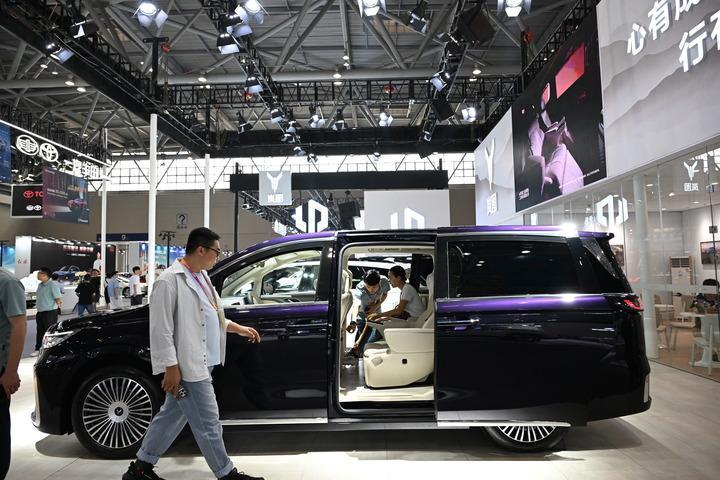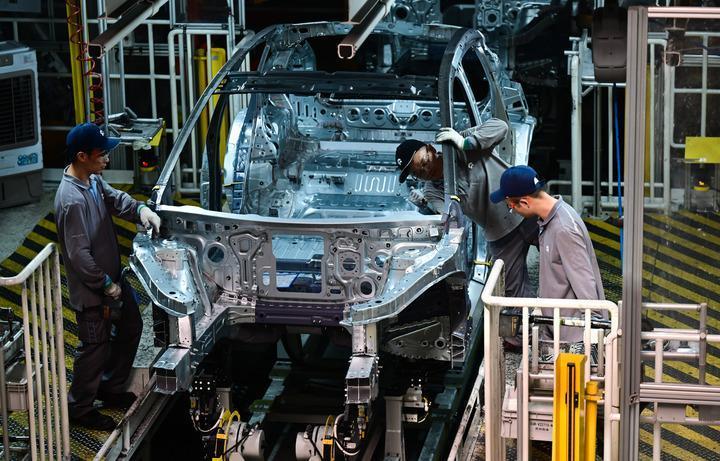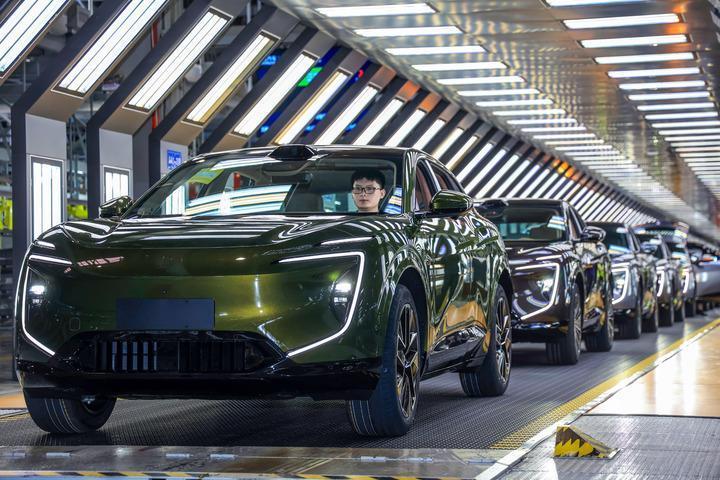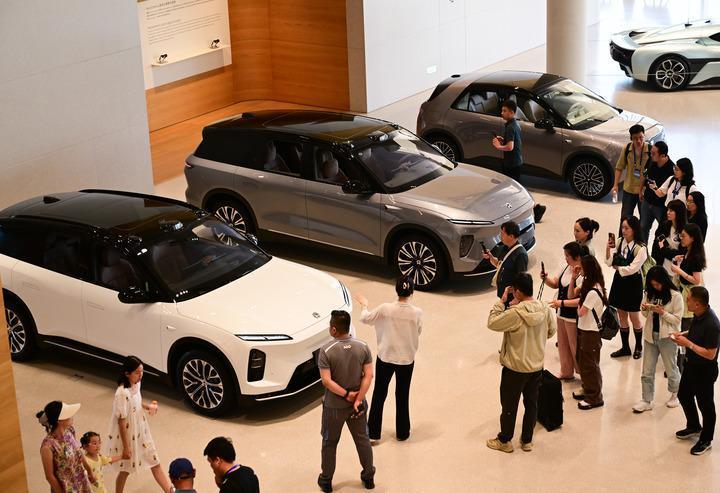




BEIJING, Oct. 3 (Xinhua) -- At an NEV super factory in Beijing's suburban Miyun District, metal sheets are precision-pressed into body panels with microscopic accuracy, while robotic arms assemble components amid a flurry of welding sparks.
This highly intelligent facility, operated by the Beijing Automotive Industry Corporation, reflects the advanced state of China's new energy vehicle (NEV) industry, which continues to set global benchmarks in terms of both scale and innovation.
According to the China Association of Automobile Manufacturers, the country's NEV production volume surged 37.3 percent year on year to over 9.625 million units in the first eight months of 2025, while sales reached 9.62 million units, a 36.7-percent increase, highlighting robust manufacturing capacity and strong market demand.
China produced more than 12.88 million NEVs and sold 12.86 million of them in 2024, and has led the world in NEV production and sales for the past ten consecutive years.

INNOVATION FUELS GROWTH
The NEV sector's impressive performance is underpinned by relentless technological innovation and a complete industrial chain in China.
A flurry of technological breakthroughs have emerged across the industry this year, spanning power batteries, intelligent driving systems, ultra-fast charging and ecosystem integration, underlining the sector's dynamism.
Earlier this year, China's CATL, a global leader in battery production, announced that its all-solid-state battery research and development had entered the pre-mass production stage, featuring an energy density more than 30 percent higher than traditional liquid lithium batteries and a lifecycle exceeding 2,000 charges.
Meanwhile, BYD, another Chinese NEV pioneer, recently unveiled its super E-platform, providing a charging speed that enables a 400-kilometer driving range with just a 5-minute charge.
Furthermore, Chinese automakers are leveraging artificial intelligence (AI) to transform vehicles from traditional mechanical products into "smart mobile terminals," with learning, decision-making and interactive capabilities.
At the 2025 Shanghai International Auto Show in April, multiple automakers showcased their intelligent driving advances. Huawei presented its latest intelligent driving system Qiankun ADS 4.0, which reportedly cuts end-to-end latency by half and improves traffic efficiency by 20 percent, while Xpeng Motors unveiled its Turing AI autonomous driving chip.
According to Xin Guobin, deputy minister of Industry and Information Technology, during the 14th Five-Year Plan period (2021-2025), the country has kept formulating industrial development plans at the national level. Enterprises within the NEV industry have stepped up investment, tackled a series of major technological challenges, and achieved substantial improvements in product quality and performance.
Xin cited examples such as the average range of Chinese-made electric passenger vehicles elevating to nearly 500 kilometers, the unit cost of power batteries dropping by 30 percent and their lifespan increasing by 40 percent, as well as charging speed improving more than threefold.

SUPPLY CHAIN POWERS PROGRESS
A robust, deeply integrated, and open supply chain, from raw material processing and battery manufacturing to vehicle assembly and software development, continues to underpin the sector's momentum.
Industry giants like CATL and BYD are complemented by a dense network of suppliers, many of whom are clustered in industrial hubs across the Yangtze River Delta and the Pearl River Delta, facilitating efficient collaboration and rapid iteration.
The Yangtze River Delta, for instance, has built a "4-hour industrial ecosystem," where any NEV plant can obtain all required parts within a four-hour drive.
Within this collaborative cluster, Shanghai in east China offers the industry a technological "brain" comprised of chips and software. Changzhou in Jiangsu Province, also in east China and some 200 kilometers to the west of Shanghai, supplies the "heart" in the form of power batteries, while Ningbo in east China's Zhejiang Province, 200 kilometers to the south of Shanghai, contributes the "body" of vehicles via advanced integrated die-casting machines.
Changzhou has established an NEV industrial chain covering more than ten sectors, including powertrain, braking system, steering system, electrical instrumentation, lighting, vehicle bodies and interior trim. Over 3,000 related manufacturing enterprises have gathered in this city, generating an output value of 300 billion yuan (approximately 42.2 billion U.S. dollars).

ECOSYSTEM CROSSES BORDERS
The openness of China's industrial ecosystem has attracted leading international automakers.
At the 2025 World New Energy Vehicle Congress recently held in Haikou, south China's Hainan Province, Sean Green, president and CEO of BMW Group Region China, showcased the veteran carmaker's partnerships with China's domestic leaders in batteries, driver-assist systems and AI foundation models.
Green highlighted joint projects with battery giant CATL to co-design large cylindrical cells, a partnership with Chinese self-driving startup Momenta to develop driver-assist software, and a collaboration to integrate Alibaba's AI foundation model and Huawei's intelligent-vehicle stack into BMW cars.
"This goes beyond conventional partnerships," said Green, adding that such projects form "a symbiotic ecosystem that benefits both sides." Green also expressed the view that "technology openness is the valuable experience we took from China's success."
Toyota, meanwhile, signed an agreement with the Shanghai municipal government in April 2025 to invest 14.6 billion yuan in establishing an NEV company to produce Lexus-branded electric vehicles and Toyota power batteries.
Building on its domestic strength, China's NEV industry is going global and forging partnerships with automotive supply chains worldwide to achieve shared growth.
In Thailand, BYD's new Rayong plant features advanced flexible production, boosting local industrial capabilities. In Malaysia, Geely's investment is helping revive local automaker Proton and transform Tanjong Malim into an ASEAN car manufacturing hub by jointly developing an automotive high-tech valley.
Through such efforts, Chinese NEV manufacturers are exporting an entire industrial ecosystem to their partners, fostering local automotive development and enabling collaborative growth worldwide.
Copyright ? 2001-2025 湖北荊楚網絡科技股份有限公司 All Rights Reserved
互聯網新聞信息許可證 4212025003 -
增值電信業務經營許可證 鄂B2-20231273 -
廣播電視節目制作經營許可證(鄂)字第00011號
信息網絡傳播視聽節目許可證 1706144 -
互聯網出版許可證 (鄂)字3號 -
營業執照
鄂ICP備 13000573號-1  鄂公網安備 42010602000206號
鄂公網安備 42010602000206號
版權為 荊楚網 www.cnhubei.com 所有 未經同意不得復制或鏡像